LBA5304 Assignment: Shares, Insolvency, Director's Duties Analysis
VerifiedAdded on 2020/10/19
|10
|2447
|145
Report
AI Summary
This report, prepared for the Legal Aspect in Business course (LBA5304), examines critical aspects of company law, including shares, insolvency, and the duties of company directors. The report begins by differentiating between ordinary and preference shares, delving into redeemable participating preference shares and class rights, and how these rights can be altered. It then moves on to the concept of insolvency, defining it and outlining the responsibilities of company directors, such as acting within their powers, promoting company success, exercising independent judgment, avoiding conflicts of interest, and disclosing interests in transactions. The report also details the different types of directors and concludes with a discussion of wrongful and fraudulent trading, highlighting the legal consequences of each. This assignment provides a comprehensive overview of the legal framework governing company operations and the obligations of its key stakeholders.
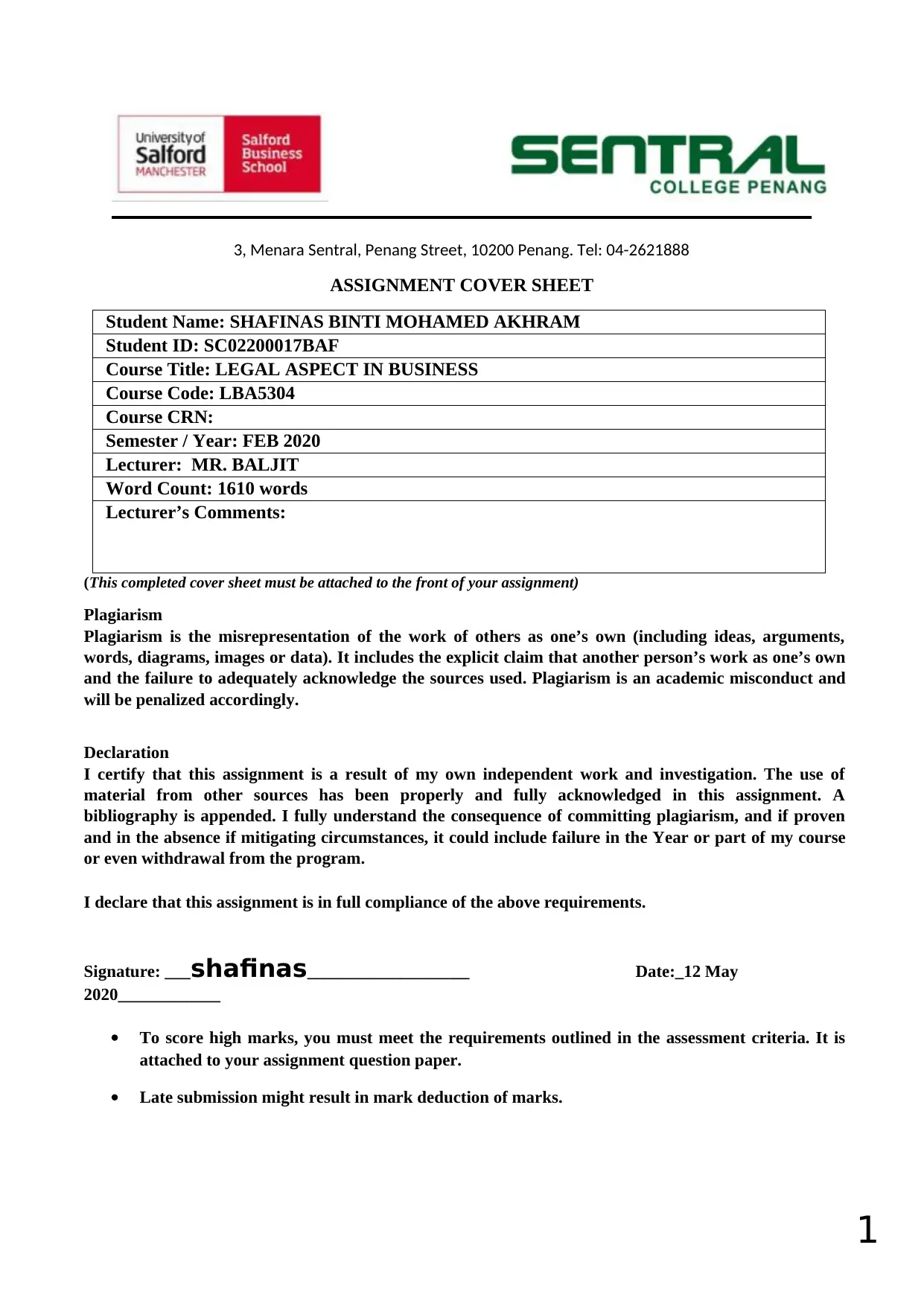
1
3, Menara Sentral, Penang Street, 10200 Penang. Tel: 04-2621888
ASSIGNMENT COVER SHEET
Student Name: SHAFINAS BINTI MOHAMED AKHRAM
Student ID: SC02200017BAF
Course Title: LEGAL ASPECT IN BUSINESS
Course Code: LBA5304
Course CRN:
Semester / Year: FEB 2020
Lecturer: MR. BALJIT
Word Count: 1610 words
Lecturer’s Comments:
(This completed cover sheet must be attached to the front of your assignment)
Plagiarism
Plagiarism is the misrepresentation of the work of others as one’s own (including ideas, arguments,
words, diagrams, images or data). It includes the explicit claim that another person’s work as one’s own
and the failure to adequately acknowledge the sources used. Plagiarism is an academic misconduct and
will be penalized accordingly.
Declaration
I certify that this assignment is a result of my own independent work and investigation. The use of
material from other sources has been properly and fully acknowledged in this assignment. A
bibliography is appended. I fully understand the consequence of committing plagiarism, and if proven
and in the absence if mitigating circumstances, it could include failure in the Year or part of my course
or even withdrawal from the program.
I declare that this assignment is in full compliance of the above requirements.
Signature: ___shafinas___________________ Date:_12 May
2020____________
To score high marks, you must meet the requirements outlined in the assessment criteria. It is
attached to your assignment question paper.
Late submission might result in mark deduction of marks.
3, Menara Sentral, Penang Street, 10200 Penang. Tel: 04-2621888
ASSIGNMENT COVER SHEET
Student Name: SHAFINAS BINTI MOHAMED AKHRAM
Student ID: SC02200017BAF
Course Title: LEGAL ASPECT IN BUSINESS
Course Code: LBA5304
Course CRN:
Semester / Year: FEB 2020
Lecturer: MR. BALJIT
Word Count: 1610 words
Lecturer’s Comments:
(This completed cover sheet must be attached to the front of your assignment)
Plagiarism
Plagiarism is the misrepresentation of the work of others as one’s own (including ideas, arguments,
words, diagrams, images or data). It includes the explicit claim that another person’s work as one’s own
and the failure to adequately acknowledge the sources used. Plagiarism is an academic misconduct and
will be penalized accordingly.
Declaration
I certify that this assignment is a result of my own independent work and investigation. The use of
material from other sources has been properly and fully acknowledged in this assignment. A
bibliography is appended. I fully understand the consequence of committing plagiarism, and if proven
and in the absence if mitigating circumstances, it could include failure in the Year or part of my course
or even withdrawal from the program.
I declare that this assignment is in full compliance of the above requirements.
Signature: ___shafinas___________________ Date:_12 May
2020____________
To score high marks, you must meet the requirements outlined in the assessment criteria. It is
attached to your assignment question paper.
Late submission might result in mark deduction of marks.
Paraphrase This Document
Need a fresh take? Get an instant paraphrase of this document with our AI Paraphraser
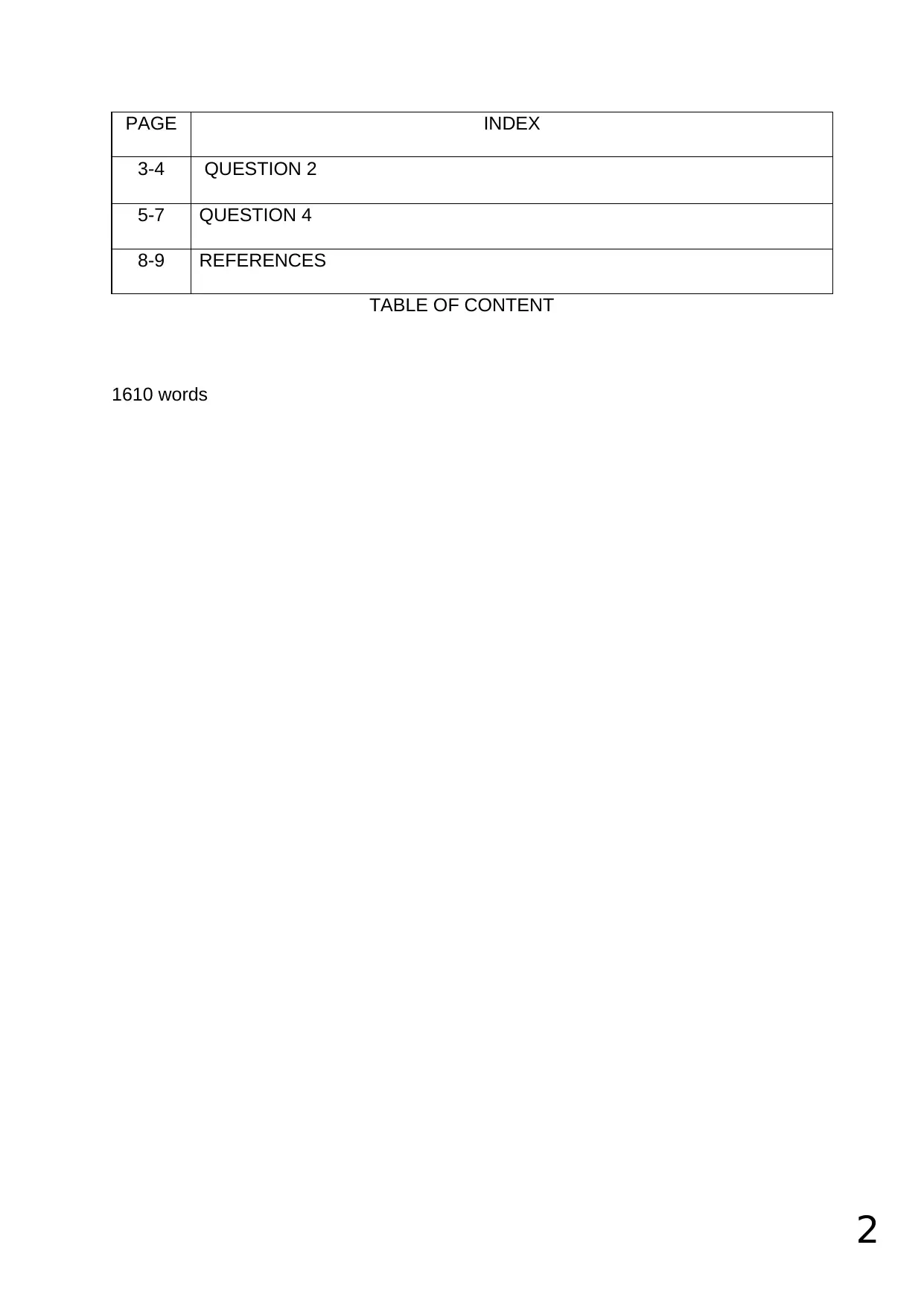
2
PAGE INDEX
3-4 QUESTION 2
5-7 QUESTION 4
8-9 REFERENCES
TABLE OF CONTENT
1610 words
PAGE INDEX
3-4 QUESTION 2
5-7 QUESTION 4
8-9 REFERENCES
TABLE OF CONTENT
1610 words
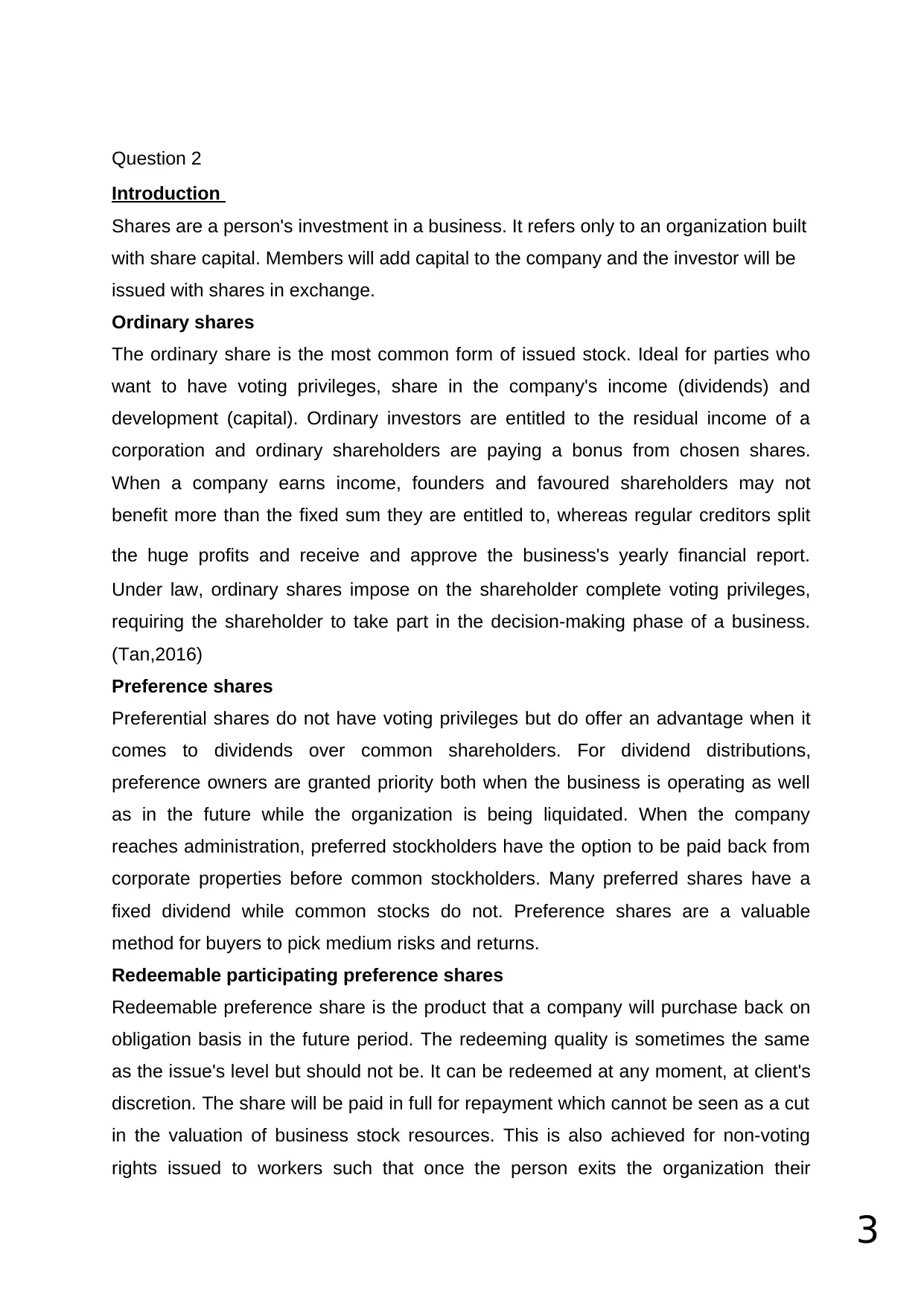
3
Question 2
Introduction
Shares are a person's investment in a business. It refers only to an organization built
with share capital. Members will add capital to the company and the investor will be
issued with shares in exchange.
Ordinary shares
The ordinary share is the most common form of issued stock. Ideal for parties who
want to have voting privileges, share in the company's income (dividends) and
development (capital). Ordinary investors are entitled to the residual income of a
corporation and ordinary shareholders are paying a bonus from chosen shares.
When a company earns income, founders and favoured shareholders may not
benefit more than the fixed sum they are entitled to, whereas regular creditors split
the huge profits and receive and approve the business's yearly financial report.
Under law, ordinary shares impose on the shareholder complete voting privileges,
requiring the shareholder to take part in the decision-making phase of a business.
(Tan,2016)
Preference shares
Preferential shares do not have voting privileges but do offer an advantage when it
comes to dividends over common shareholders. For dividend distributions,
preference owners are granted priority both when the business is operating as well
as in the future while the organization is being liquidated. When the company
reaches administration, preferred stockholders have the option to be paid back from
corporate properties before common stockholders. Many preferred shares have a
fixed dividend while common stocks do not. Preference shares are a valuable
method for buyers to pick medium risks and returns.
Redeemable participating preference shares
Redeemable preference share is the product that a company will purchase back on
obligation basis in the future period. The redeeming quality is sometimes the same
as the issue's level but should not be. It can be redeemed at any moment, at client's
discretion. The share will be paid in full for repayment which cannot be seen as a cut
in the valuation of business stock resources. This is also achieved for non-voting
rights issued to workers such that once the person exits the organization their
Question 2
Introduction
Shares are a person's investment in a business. It refers only to an organization built
with share capital. Members will add capital to the company and the investor will be
issued with shares in exchange.
Ordinary shares
The ordinary share is the most common form of issued stock. Ideal for parties who
want to have voting privileges, share in the company's income (dividends) and
development (capital). Ordinary investors are entitled to the residual income of a
corporation and ordinary shareholders are paying a bonus from chosen shares.
When a company earns income, founders and favoured shareholders may not
benefit more than the fixed sum they are entitled to, whereas regular creditors split
the huge profits and receive and approve the business's yearly financial report.
Under law, ordinary shares impose on the shareholder complete voting privileges,
requiring the shareholder to take part in the decision-making phase of a business.
(Tan,2016)
Preference shares
Preferential shares do not have voting privileges but do offer an advantage when it
comes to dividends over common shareholders. For dividend distributions,
preference owners are granted priority both when the business is operating as well
as in the future while the organization is being liquidated. When the company
reaches administration, preferred stockholders have the option to be paid back from
corporate properties before common stockholders. Many preferred shares have a
fixed dividend while common stocks do not. Preference shares are a valuable
method for buyers to pick medium risks and returns.
Redeemable participating preference shares
Redeemable preference share is the product that a company will purchase back on
obligation basis in the future period. The redeeming quality is sometimes the same
as the issue's level but should not be. It can be redeemed at any moment, at client's
discretion. The share will be paid in full for repayment which cannot be seen as a cut
in the valuation of business stock resources. This is also achieved for non-voting
rights issued to workers such that once the person exits the organization their
⊘ This is a preview!⊘
Do you want full access?
Subscribe today to unlock all pages.

Trusted by 1+ million students worldwide
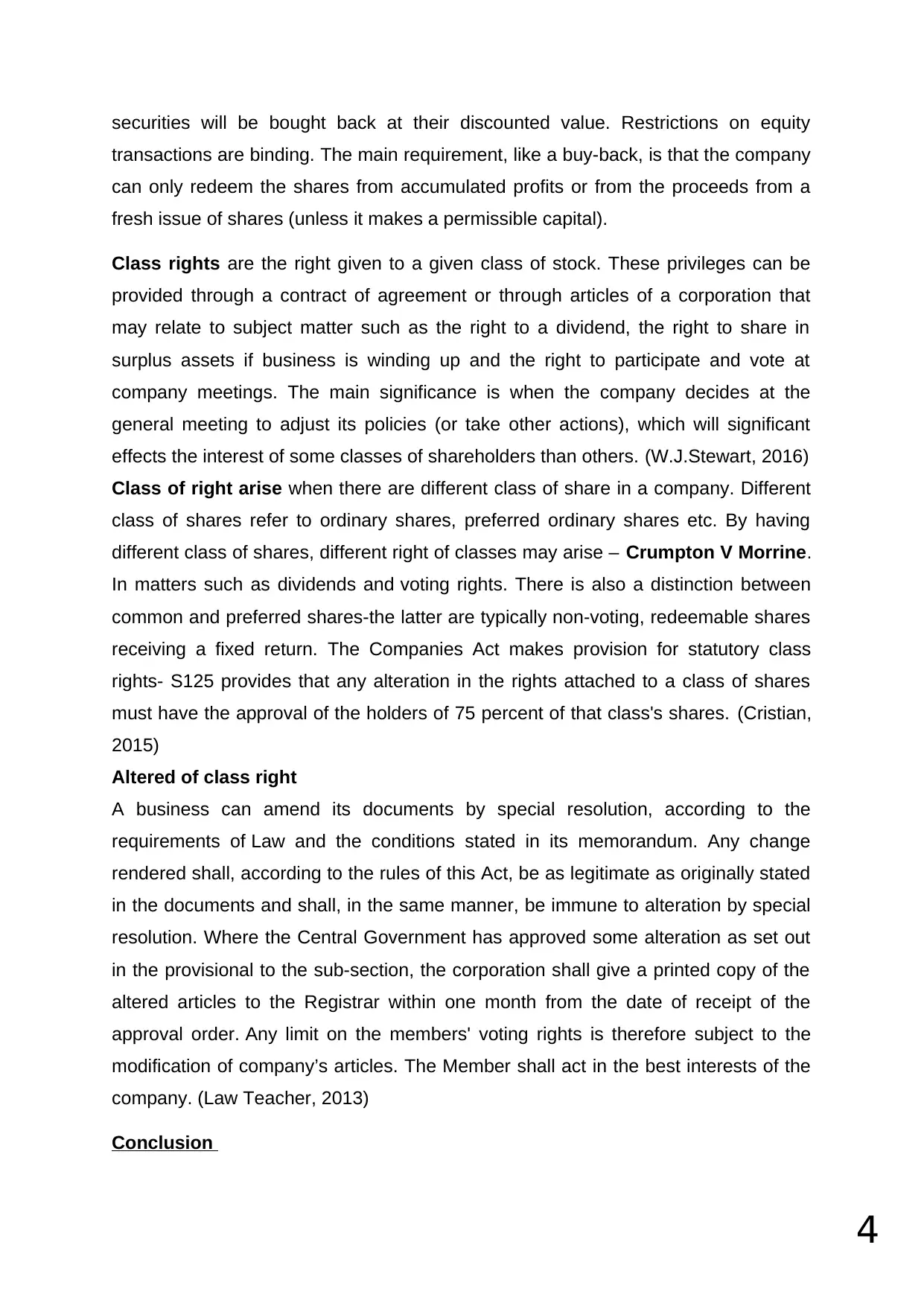
4
securities will be bought back at their discounted value. Restrictions on equity
transactions are binding. The main requirement, like a buy-back, is that the company
can only redeem the shares from accumulated profits or from the proceeds from a
fresh issue of shares (unless it makes a permissible capital).
Class rights are the right given to a given class of stock. These privileges can be
provided through a contract of agreement or through articles of a corporation that
may relate to subject matter such as the right to a dividend, the right to share in
surplus assets if business is winding up and the right to participate and vote at
company meetings. The main significance is when the company decides at the
general meeting to adjust its policies (or take other actions), which will significant
effects the interest of some classes of shareholders than others. (W.J.Stewart, 2016)
Class of right arise when there are different class of share in a company. Different
class of shares refer to ordinary shares, preferred ordinary shares etc. By having
different class of shares, different right of classes may arise – Crumpton V Morrine.
In matters such as dividends and voting rights. There is also a distinction between
common and preferred shares-the latter are typically non-voting, redeemable shares
receiving a fixed return. The Companies Act makes provision for statutory class
rights- S125 provides that any alteration in the rights attached to a class of shares
must have the approval of the holders of 75 percent of that class's shares. (Cristian,
2015)
Altered of class right
A business can amend its documents by special resolution, according to the
requirements of Law and the conditions stated in its memorandum. Any change
rendered shall, according to the rules of this Act, be as legitimate as originally stated
in the documents and shall, in the same manner, be immune to alteration by special
resolution. Where the Central Government has approved some alteration as set out
in the provisional to the sub-section, the corporation shall give a printed copy of the
altered articles to the Registrar within one month from the date of receipt of the
approval order. Any limit on the members' voting rights is therefore subject to the
modification of company’s articles. The Member shall act in the best interests of the
company. (Law Teacher, 2013)
Conclusion
securities will be bought back at their discounted value. Restrictions on equity
transactions are binding. The main requirement, like a buy-back, is that the company
can only redeem the shares from accumulated profits or from the proceeds from a
fresh issue of shares (unless it makes a permissible capital).
Class rights are the right given to a given class of stock. These privileges can be
provided through a contract of agreement or through articles of a corporation that
may relate to subject matter such as the right to a dividend, the right to share in
surplus assets if business is winding up and the right to participate and vote at
company meetings. The main significance is when the company decides at the
general meeting to adjust its policies (or take other actions), which will significant
effects the interest of some classes of shareholders than others. (W.J.Stewart, 2016)
Class of right arise when there are different class of share in a company. Different
class of shares refer to ordinary shares, preferred ordinary shares etc. By having
different class of shares, different right of classes may arise – Crumpton V Morrine.
In matters such as dividends and voting rights. There is also a distinction between
common and preferred shares-the latter are typically non-voting, redeemable shares
receiving a fixed return. The Companies Act makes provision for statutory class
rights- S125 provides that any alteration in the rights attached to a class of shares
must have the approval of the holders of 75 percent of that class's shares. (Cristian,
2015)
Altered of class right
A business can amend its documents by special resolution, according to the
requirements of Law and the conditions stated in its memorandum. Any change
rendered shall, according to the rules of this Act, be as legitimate as originally stated
in the documents and shall, in the same manner, be immune to alteration by special
resolution. Where the Central Government has approved some alteration as set out
in the provisional to the sub-section, the corporation shall give a printed copy of the
altered articles to the Registrar within one month from the date of receipt of the
approval order. Any limit on the members' voting rights is therefore subject to the
modification of company’s articles. The Member shall act in the best interests of the
company. (Law Teacher, 2013)
Conclusion
Paraphrase This Document
Need a fresh take? Get an instant paraphrase of this document with our AI Paraphraser
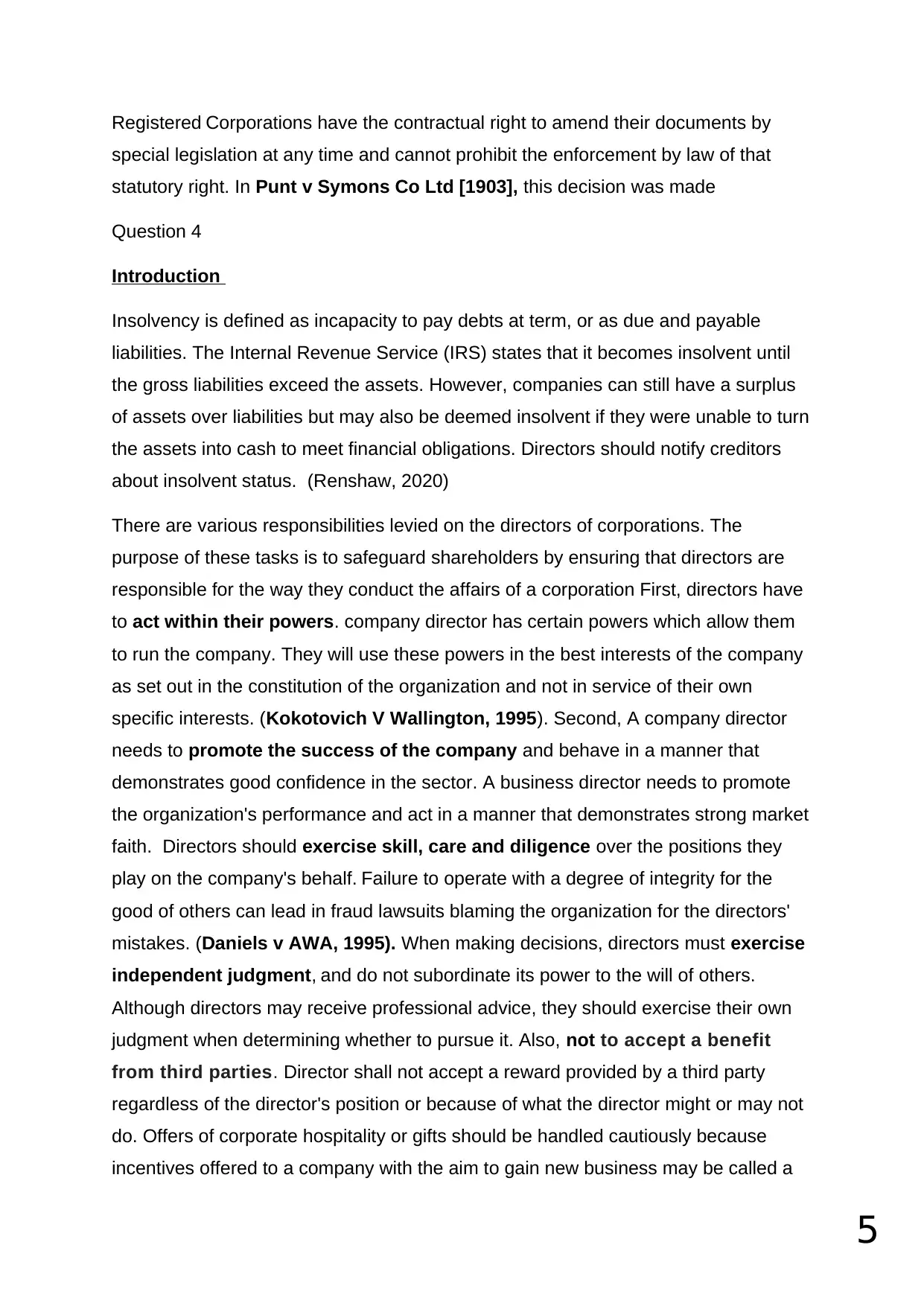
5
Registered Corporations have the contractual right to amend their documents by
special legislation at any time and cannot prohibit the enforcement by law of that
statutory right. In Punt v Symons Co Ltd [1903], this decision was made
Question 4
Introduction
Insolvency is defined as incapacity to pay debts at term, or as due and payable
liabilities. The Internal Revenue Service (IRS) states that it becomes insolvent until
the gross liabilities exceed the assets. However, companies can still have a surplus
of assets over liabilities but may also be deemed insolvent if they were unable to turn
the assets into cash to meet financial obligations. Directors should notify creditors
about insolvent status. (Renshaw, 2020)
There are various responsibilities levied on the directors of corporations. The
purpose of these tasks is to safeguard shareholders by ensuring that directors are
responsible for the way they conduct the affairs of a corporation First, directors have
to act within their powers. company director has certain powers which allow them
to run the company. They will use these powers in the best interests of the company
as set out in the constitution of the organization and not in service of their own
specific interests. (Kokotovich V Wallington, 1995). Second, A company director
needs to promote the success of the company and behave in a manner that
demonstrates good confidence in the sector. A business director needs to promote
the organization's performance and act in a manner that demonstrates strong market
faith. Directors should exercise skill, care and diligence over the positions they
play on the company's behalf. Failure to operate with a degree of integrity for the
good of others can lead in fraud lawsuits blaming the organization for the directors'
mistakes. (Daniels v AWA, 1995). When making decisions, directors must exercise
independent judgment, and do not subordinate its power to the will of others.
Although directors may receive professional advice, they should exercise their own
judgment when determining whether to pursue it. Also, not to accept a benefit
from third parties. Director shall not accept a reward provided by a third party
regardless of the director's position or because of what the director might or may not
do. Offers of corporate hospitality or gifts should be handled cautiously because
incentives offered to a company with the aim to gain new business may be called a
Registered Corporations have the contractual right to amend their documents by
special legislation at any time and cannot prohibit the enforcement by law of that
statutory right. In Punt v Symons Co Ltd [1903], this decision was made
Question 4
Introduction
Insolvency is defined as incapacity to pay debts at term, or as due and payable
liabilities. The Internal Revenue Service (IRS) states that it becomes insolvent until
the gross liabilities exceed the assets. However, companies can still have a surplus
of assets over liabilities but may also be deemed insolvent if they were unable to turn
the assets into cash to meet financial obligations. Directors should notify creditors
about insolvent status. (Renshaw, 2020)
There are various responsibilities levied on the directors of corporations. The
purpose of these tasks is to safeguard shareholders by ensuring that directors are
responsible for the way they conduct the affairs of a corporation First, directors have
to act within their powers. company director has certain powers which allow them
to run the company. They will use these powers in the best interests of the company
as set out in the constitution of the organization and not in service of their own
specific interests. (Kokotovich V Wallington, 1995). Second, A company director
needs to promote the success of the company and behave in a manner that
demonstrates good confidence in the sector. A business director needs to promote
the organization's performance and act in a manner that demonstrates strong market
faith. Directors should exercise skill, care and diligence over the positions they
play on the company's behalf. Failure to operate with a degree of integrity for the
good of others can lead in fraud lawsuits blaming the organization for the directors'
mistakes. (Daniels v AWA, 1995). When making decisions, directors must exercise
independent judgment, and do not subordinate its power to the will of others.
Although directors may receive professional advice, they should exercise their own
judgment when determining whether to pursue it. Also, not to accept a benefit
from third parties. Director shall not accept a reward provided by a third party
regardless of the director's position or because of what the director might or may not
do. Offers of corporate hospitality or gifts should be handled cautiously because
incentives offered to a company with the aim to gain new business may be called a
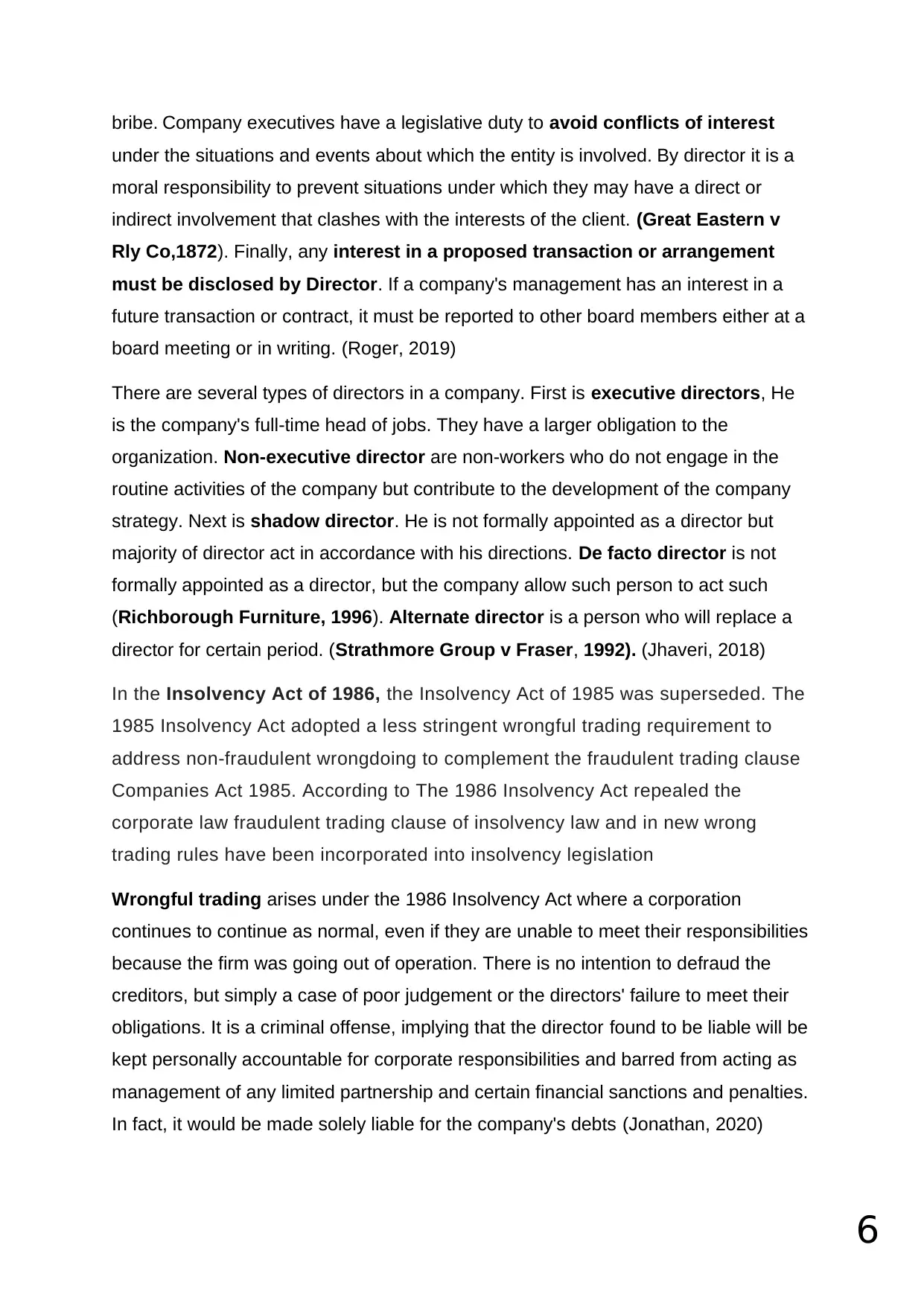
6
bribe. Company executives have a legislative duty to avoid conflicts of interest
under the situations and events about which the entity is involved. By director it is a
moral responsibility to prevent situations under which they may have a direct or
indirect involvement that clashes with the interests of the client. (Great Eastern v
Rly Co,1872). Finally, any interest in a proposed transaction or arrangement
must be disclosed by Director. If a company's management has an interest in a
future transaction or contract, it must be reported to other board members either at a
board meeting or in writing. (Roger, 2019)
There are several types of directors in a company. First is executive directors, He
is the company's full-time head of jobs. They have a larger obligation to the
organization. Non-executive director are non-workers who do not engage in the
routine activities of the company but contribute to the development of the company
strategy. Next is shadow director. He is not formally appointed as a director but
majority of director act in accordance with his directions. De facto director is not
formally appointed as a director, but the company allow such person to act such
(Richborough Furniture, 1996). Alternate director is a person who will replace a
director for certain period. (Strathmore Group v Fraser, 1992). (Jhaveri, 2018)
In the Insolvency Act of 1986, the Insolvency Act of 1985 was superseded. The
1985 Insolvency Act adopted a less stringent wrongful trading requirement to
address non-fraudulent wrongdoing to complement the fraudulent trading clause
Companies Act 1985. According to The 1986 Insolvency Act repealed the
corporate law fraudulent trading clause of insolvency law and in new wrong
trading rules have been incorporated into insolvency legislation
Wrongful trading arises under the 1986 Insolvency Act where a corporation
continues to continue as normal, even if they are unable to meet their responsibilities
because the firm was going out of operation. There is no intention to defraud the
creditors, but simply a case of poor judgement or the directors' failure to meet their
obligations. It is a criminal offense, implying that the director found to be liable will be
kept personally accountable for corporate responsibilities and barred from acting as
management of any limited partnership and certain financial sanctions and penalties.
In fact, it would be made solely liable for the company's debts (Jonathan, 2020)
bribe. Company executives have a legislative duty to avoid conflicts of interest
under the situations and events about which the entity is involved. By director it is a
moral responsibility to prevent situations under which they may have a direct or
indirect involvement that clashes with the interests of the client. (Great Eastern v
Rly Co,1872). Finally, any interest in a proposed transaction or arrangement
must be disclosed by Director. If a company's management has an interest in a
future transaction or contract, it must be reported to other board members either at a
board meeting or in writing. (Roger, 2019)
There are several types of directors in a company. First is executive directors, He
is the company's full-time head of jobs. They have a larger obligation to the
organization. Non-executive director are non-workers who do not engage in the
routine activities of the company but contribute to the development of the company
strategy. Next is shadow director. He is not formally appointed as a director but
majority of director act in accordance with his directions. De facto director is not
formally appointed as a director, but the company allow such person to act such
(Richborough Furniture, 1996). Alternate director is a person who will replace a
director for certain period. (Strathmore Group v Fraser, 1992). (Jhaveri, 2018)
In the Insolvency Act of 1986, the Insolvency Act of 1985 was superseded. The
1985 Insolvency Act adopted a less stringent wrongful trading requirement to
address non-fraudulent wrongdoing to complement the fraudulent trading clause
Companies Act 1985. According to The 1986 Insolvency Act repealed the
corporate law fraudulent trading clause of insolvency law and in new wrong
trading rules have been incorporated into insolvency legislation
Wrongful trading arises under the 1986 Insolvency Act where a corporation
continues to continue as normal, even if they are unable to meet their responsibilities
because the firm was going out of operation. There is no intention to defraud the
creditors, but simply a case of poor judgement or the directors' failure to meet their
obligations. It is a criminal offense, implying that the director found to be liable will be
kept personally accountable for corporate responsibilities and barred from acting as
management of any limited partnership and certain financial sanctions and penalties.
In fact, it would be made solely liable for the company's debts (Jonathan, 2020)
⊘ This is a preview!⊘
Do you want full access?
Subscribe today to unlock all pages.

Trusted by 1+ million students worldwide
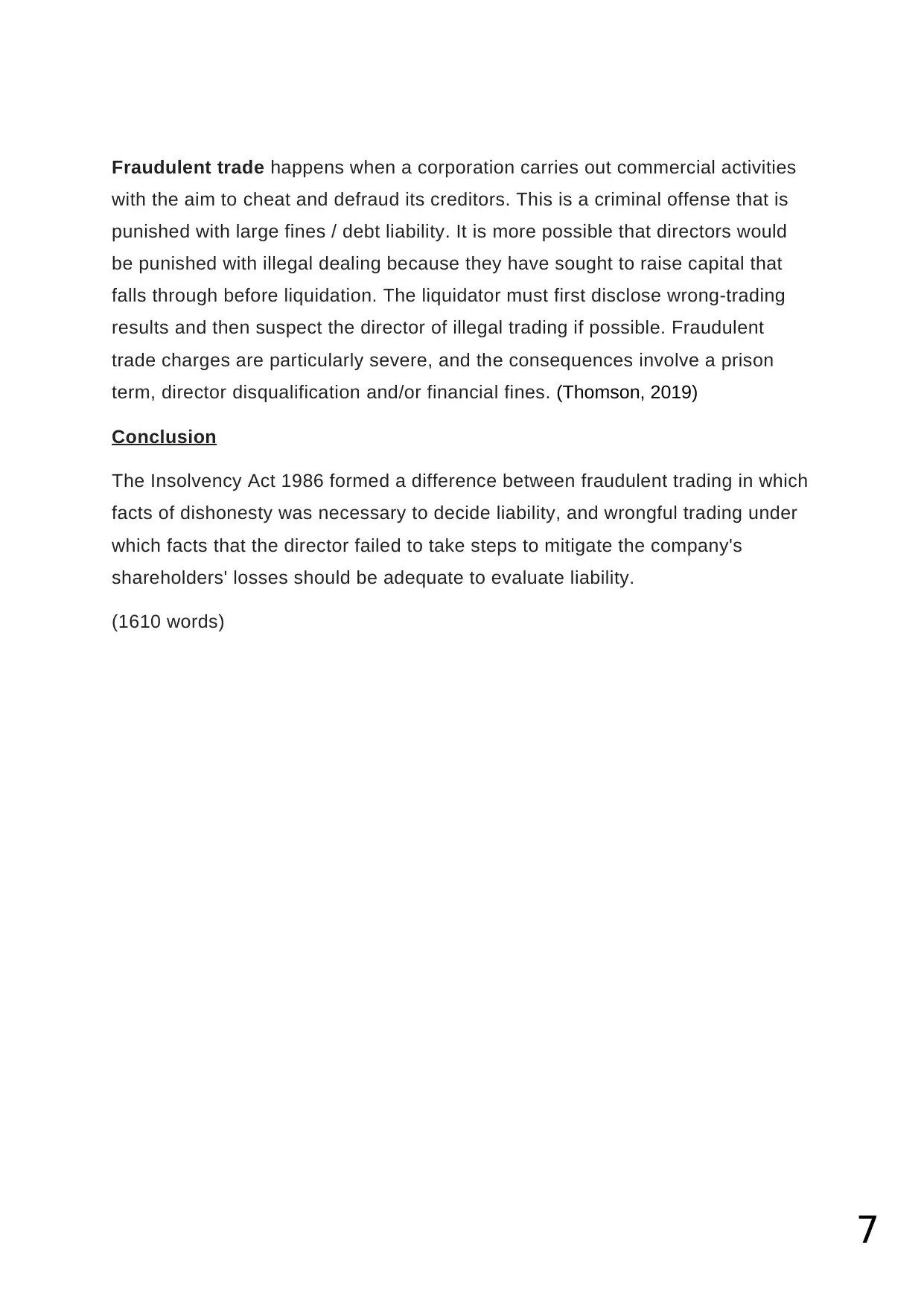
7
Fraudulent trade happens when a corporation carries out commercial activities
with the aim to cheat and defraud its creditors. This is a criminal offense that is
punished with large fines / debt liability. It is more possible that directors would
be punished with illegal dealing because they have sought to raise capital that
falls through before liquidation. The liquidator must first disclose wrong-trading
results and then suspect the director of illegal trading if possible. Fraudulent
trade charges are particularly severe, and the consequences involve a prison
term, director disqualification and/or financial fines. (Thomson, 2019)
Conclusion
The Insolvency Act 1986 formed a difference between fraudulent trading in which
facts of dishonesty was necessary to decide liability, and wrongful trading under
which facts that the director failed to take steps to mitigate the company's
shareholders' losses should be adequate to evaluate liability.
(1610 words)
Fraudulent trade happens when a corporation carries out commercial activities
with the aim to cheat and defraud its creditors. This is a criminal offense that is
punished with large fines / debt liability. It is more possible that directors would
be punished with illegal dealing because they have sought to raise capital that
falls through before liquidation. The liquidator must first disclose wrong-trading
results and then suspect the director of illegal trading if possible. Fraudulent
trade charges are particularly severe, and the consequences involve a prison
term, director disqualification and/or financial fines. (Thomson, 2019)
Conclusion
The Insolvency Act 1986 formed a difference between fraudulent trading in which
facts of dishonesty was necessary to decide liability, and wrongful trading under
which facts that the director failed to take steps to mitigate the company's
shareholders' losses should be adequate to evaluate liability.
(1610 words)
Paraphrase This Document
Need a fresh take? Get an instant paraphrase of this document with our AI Paraphraser
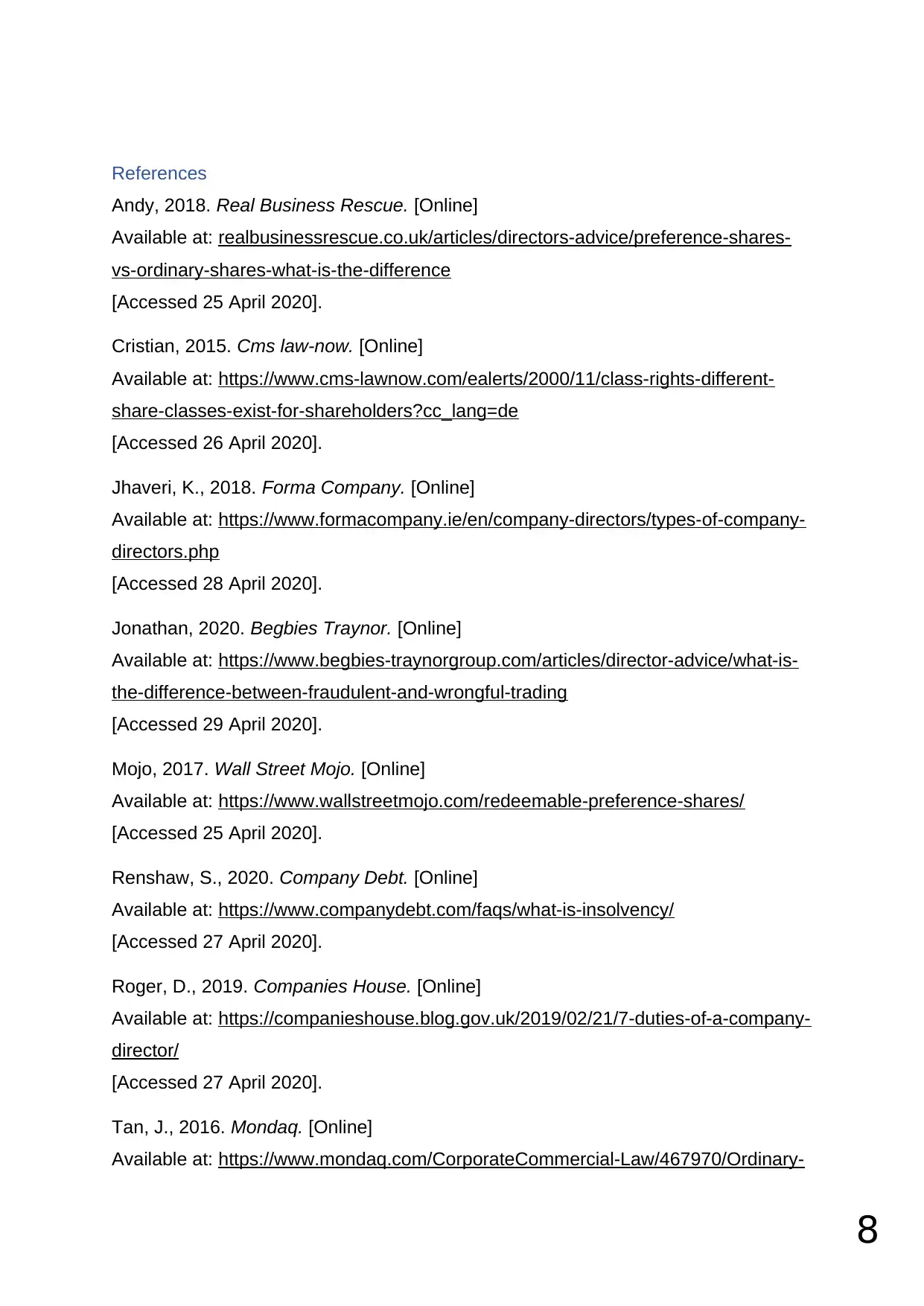
8
References
Andy, 2018. Real Business Rescue. [Online]
Available at: realbusinessrescue.co.uk/articles/directors-advice/preference-shares-
vs-ordinary-shares-what-is-the-difference
[Accessed 25 April 2020].
Cristian, 2015. Cms law-now. [Online]
Available at: https://www.cms-lawnow.com/ealerts/2000/11/class-rights-different-
share-classes-exist-for-shareholders?cc_lang=de
[Accessed 26 April 2020].
Jhaveri, K., 2018. Forma Company. [Online]
Available at: https://www.formacompany.ie/en/company-directors/types-of-company-
directors.php
[Accessed 28 April 2020].
Jonathan, 2020. Begbies Traynor. [Online]
Available at: https://www.begbies-traynorgroup.com/articles/director-advice/what-is-
the-difference-between-fraudulent-and-wrongful-trading
[Accessed 29 April 2020].
Mojo, 2017. Wall Street Mojo. [Online]
Available at: https://www.wallstreetmojo.com/redeemable-preference-shares/
[Accessed 25 April 2020].
Renshaw, S., 2020. Company Debt. [Online]
Available at: https://www.companydebt.com/faqs/what-is-insolvency/
[Accessed 27 April 2020].
Roger, D., 2019. Companies House. [Online]
Available at: https://companieshouse.blog.gov.uk/2019/02/21/7-duties-of-a-company-
director/
[Accessed 27 April 2020].
Tan, J., 2016. Mondaq. [Online]
Available at: https://www.mondaq.com/CorporateCommercial-Law/467970/Ordinary-
References
Andy, 2018. Real Business Rescue. [Online]
Available at: realbusinessrescue.co.uk/articles/directors-advice/preference-shares-
vs-ordinary-shares-what-is-the-difference
[Accessed 25 April 2020].
Cristian, 2015. Cms law-now. [Online]
Available at: https://www.cms-lawnow.com/ealerts/2000/11/class-rights-different-
share-classes-exist-for-shareholders?cc_lang=de
[Accessed 26 April 2020].
Jhaveri, K., 2018. Forma Company. [Online]
Available at: https://www.formacompany.ie/en/company-directors/types-of-company-
directors.php
[Accessed 28 April 2020].
Jonathan, 2020. Begbies Traynor. [Online]
Available at: https://www.begbies-traynorgroup.com/articles/director-advice/what-is-
the-difference-between-fraudulent-and-wrongful-trading
[Accessed 29 April 2020].
Mojo, 2017. Wall Street Mojo. [Online]
Available at: https://www.wallstreetmojo.com/redeemable-preference-shares/
[Accessed 25 April 2020].
Renshaw, S., 2020. Company Debt. [Online]
Available at: https://www.companydebt.com/faqs/what-is-insolvency/
[Accessed 27 April 2020].
Roger, D., 2019. Companies House. [Online]
Available at: https://companieshouse.blog.gov.uk/2019/02/21/7-duties-of-a-company-
director/
[Accessed 27 April 2020].
Tan, J., 2016. Mondaq. [Online]
Available at: https://www.mondaq.com/CorporateCommercial-Law/467970/Ordinary-
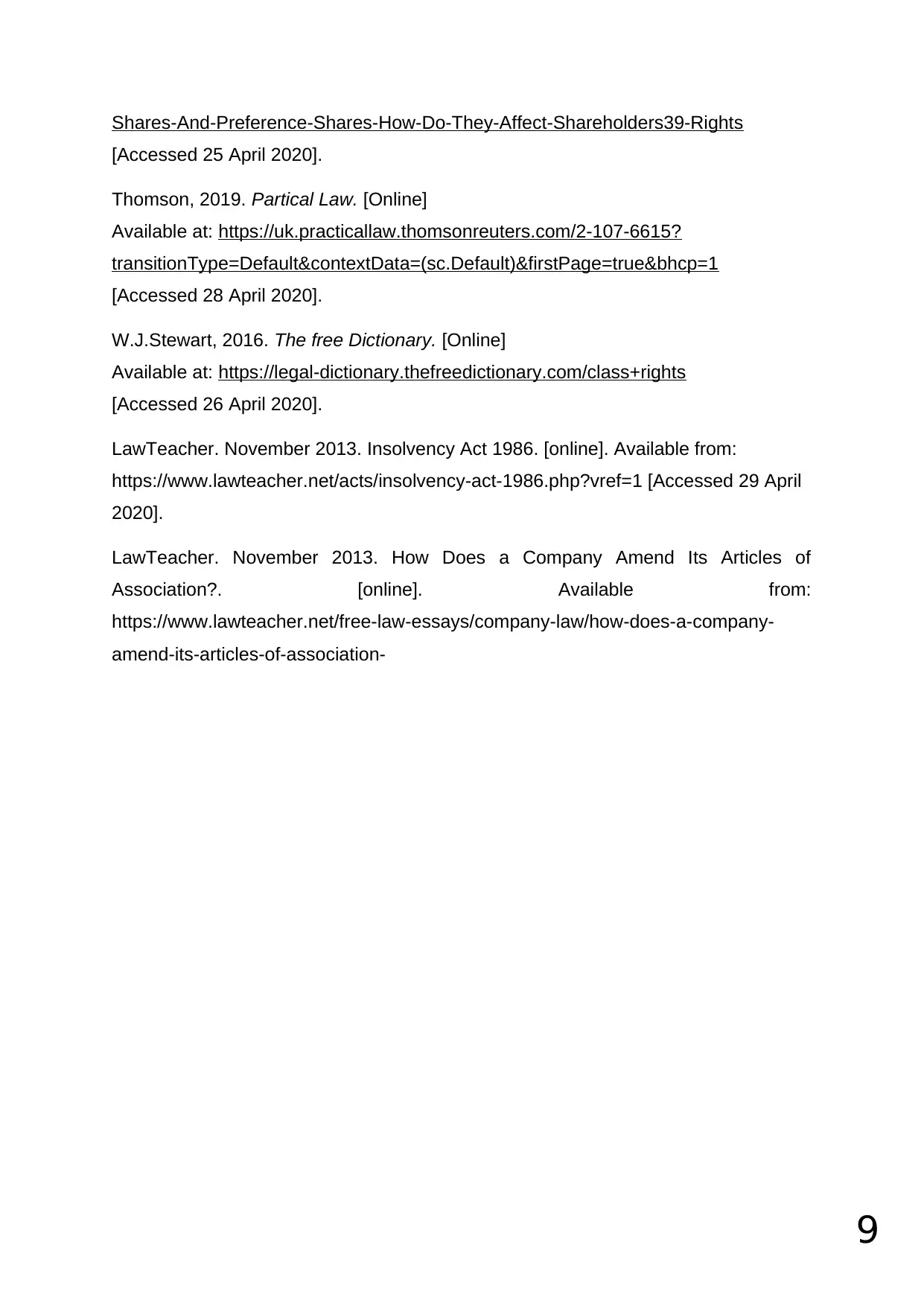
9
Shares-And-Preference-Shares-How-Do-They-Affect-Shareholders39-Rights
[Accessed 25 April 2020].
Thomson, 2019. Partical Law. [Online]
Available at: https://uk.practicallaw.thomsonreuters.com/2-107-6615?
transitionType=Default&contextData=(sc.Default)&firstPage=true&bhcp=1
[Accessed 28 April 2020].
W.J.Stewart, 2016. The free Dictionary. [Online]
Available at: https://legal-dictionary.thefreedictionary.com/class+rights
[Accessed 26 April 2020].
LawTeacher. November 2013. Insolvency Act 1986. [online]. Available from:
https://www.lawteacher.net/acts/insolvency-act-1986.php?vref=1 [Accessed 29 April
2020].
LawTeacher. November 2013. How Does a Company Amend Its Articles of
Association?. [online]. Available from:
https://www.lawteacher.net/free-law-essays/company-law/how-does-a-company-
amend-its-articles-of-association-
Shares-And-Preference-Shares-How-Do-They-Affect-Shareholders39-Rights
[Accessed 25 April 2020].
Thomson, 2019. Partical Law. [Online]
Available at: https://uk.practicallaw.thomsonreuters.com/2-107-6615?
transitionType=Default&contextData=(sc.Default)&firstPage=true&bhcp=1
[Accessed 28 April 2020].
W.J.Stewart, 2016. The free Dictionary. [Online]
Available at: https://legal-dictionary.thefreedictionary.com/class+rights
[Accessed 26 April 2020].
LawTeacher. November 2013. Insolvency Act 1986. [online]. Available from:
https://www.lawteacher.net/acts/insolvency-act-1986.php?vref=1 [Accessed 29 April
2020].
LawTeacher. November 2013. How Does a Company Amend Its Articles of
Association?. [online]. Available from:
https://www.lawteacher.net/free-law-essays/company-law/how-does-a-company-
amend-its-articles-of-association-
⊘ This is a preview!⊘
Do you want full access?
Subscribe today to unlock all pages.

Trusted by 1+ million students worldwide

10
1 out of 10
Your All-in-One AI-Powered Toolkit for Academic Success.
+13062052269
info@desklib.com
Available 24*7 on WhatsApp / Email
![[object Object]](/_next/static/media/star-bottom.7253800d.svg)
Unlock your academic potential
Copyright © 2020–2026 A2Z Services. All Rights Reserved. Developed and managed by ZUCOL.

